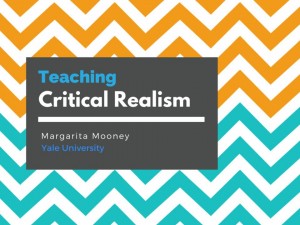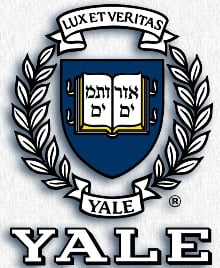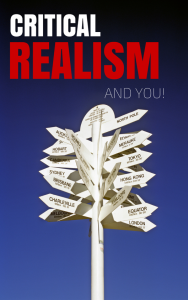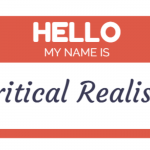This is the fourth blog in a series of posts about Critical Realism and research methods. Please register for my upcoming webinar on Tuesday, May 3, 2016 at 12 noon EDT. You can access the first, second, & third blogs here.
As part of my interest in using critical realism to teach sociological research methods, I drafted the following syllabus ideas. Although I haven’t yet taught this class, I’m sharing it with others who may be looking for ways to adapt their own research methods classes. I am particularly interested in connecting methods of data collection with normative assumptions and practical applications of sociological research.
I would welcome comments and questions on this draft syllabus.
Course Title: Fundamentals of Sociological Research for Practitioners
Instructor: Professor Margarita Mooney
Course Objectives:
This course has the following goals:
1) To introduce students to major philosophical perspectives that guide any empirical research project.
2) To review the basic methods of social research, including interviews, focus groups, ethnography, collecting survey data, and basic statistical analysis.
3) To discuss the evaluation and application of research findings to organizations.
Upon completing this class, students should be able to be able to identify the normative assumptions that guide their research questions, have practiced at least two methods of data collection, and understanding how to apply research to an organization. Specifically, students who take this class will learn how to:
- Identify the philosophical and normative assumptions inherent in any research project;
- Evaluate the strengths and limitations of various philosophical paradigms, methods, and explanations;
- Understand the basic elements of sociological research design and data collection;
- Design a research project for an organization (such as a non-profit, a religious congregation or a business).
Required Books:
- Danermark, B. Ekström, M. Jakobsen, L. Karlsson. J.C. (1997) Explaining Society: An Introduction to Critical Realism in the Social Sciences. London: Routledge.
- This book is a great overview of critical realism both as a philosophy of science and an applied, methodologically pluralist research program for the human sciences.
- Edwards, P., O’Mahoney, J. and Vincent, S. eds. (2014). Studying Organizations Using Critical Realism: A Practical Guide. Oxford: Oxford University Press.
- This book is a great guide to how critical realism sheds additional insights on various methods of data collection listed in Module 2 of this course. This book also stands out because it explicitly reflects on the challenges of applying social science to organizations.
- Douglas Porpora. 2015. Reconstructing Sociology: The Critical Realist Approach. Cambridge (UK): Cambridge University Press.
- This overview of critical realism as a philosophy of science, in particular in relation to contemporary American empirical sociology, is a helpful companion to linking metatheory to empirical research.
- Pawson, R. 2016. Evidence-Based Policy: A Realist Perspective. London: Sage Publications.
- How realism can guide attempts at systematic reviewWhy more data and meta-analyses alone can never guide policy. How to do rigorous applied social research.
- Kristin Luker. (2008) Salsa Dancing not the Social Sciences: Research in an Age of Info Glut. Cambridge, MA: Harvard University Press
- This book captures both the art and the rigor of doing social science. The powerful metaphor of salsa dancing reminds us that research should be fun! Reading this book is great fun, but I think it goes best with the Danermark et al. and Edwards et al. books because the former more explicitly address ontology, which helps ground the rigorous methodological pluralism and artistic rigor that Luker colorfully depicts.
Specific chapters from these books, and additional readings, are listed under each module below.
Module 1: Philosophical Foundations of Research (3 weeks)
Every good researcher is to some extent a good theoretician. Yet, typical approaches to research methods emphasize data collection techniques, often to the detriment of exploring the philosophical and normative assumptions made in any research project. The goal of this first module is to introduce students to various philosophical perspectives on sociological research, including positivism, post-modernism and critical realism. Topics we will cover in this module include:
- How is ontology distinct from epistemology?
- What are paradigms and how do they change?
- If social science is both an empirical and social endeavor, how do we know our findings are true?
- How do different forms of logic, including deductive, inductive and retroductive, enter into our research?
- How do our personal experiences influence our research questions and analysis?
At the end of this module, students will write a 5-8 page review of a published book on an organization. This paper should a) assess the normative assumptions in the book; b) summarize the methods of data collection; c) reflect on the argument of the book; d) raise methodological, empirical, or ontological questions unanswered in the book.
Readings:
Danermark et al., Chapters 1, 2 and 4.
Porpora, Chapters 1, 7 and 8.
Luker, Chapters 1-3.
Edwards, Chapters 1 and 2.
Module 2: Research Questions and Data Collection Methods (5 weeks)
Sociologists use numerous methods to collect data. This module will be a survey of the several research methods and will allow students to practice a few methods. In the first part of this module, we will address questions like:
- Where do our research questions come from?
- How do we write a literature review or theory section of a paper?
The second part of this module will provide students with an overview of sociological data collection techniques, such as:
- participant observation
- ethnography
- focus groups
- conducting and analyzing interviews
- action and engaged research
- internet research
- content analysis
- elementals of survey design
- analyzing survey data (primary or secondary data)
Students will be asked to pick two of the above methods and practice them, such as a) conducting an interview with a religious leader; b) engaging in an ethnographic observation of a congregation; c) analyzing secondary data from the Association of Religion Data Archives; d) designing and conducting an online survey (such as through Survey Monkey).
In the final part of this module, we will discuss: How do we analyze data and develop explanations? How much data is enough data? What do we do if our findings don’t support our expectations? How do we draw practical implications from our findings? Students will be asked to write a 5-8 page paper with the following parts:
- literature review and research questions;
- data collection;
- data analysis and explanation of major findings;
- normative assumptions and practical implications of findings.
Readings:
Luker, Chapters 4-11.
Porpora, Chapters 2, 3, 4, 5 and 6.
Danermark, Chapters 5, 6 and 7.
Module 3: Practical Research for Organizations (3 weeks)
Although many approaches to sociological research stop at describing empirical findings, leaders of organizations often want to know:
- How can empirical research help me define my organization’s objectives?
- How do I involve my own community in designing, interpreting and applying research?
- How do I lead people towards change using empirical findings?
In this final module of this course, we will discuss more in-depth engaged research, in which the community is involved in research design, data collection and interpretation of findings. We will also discuss action research, where the goal is to directly influence an organization’s members using empirical findings.
As part of this module, students will interview a leader of an organization about a research project they would be interested in being involved in. Students will write a 5-8 page engaged or action research proposal addressing the following questions: a) What are the research questions to be addressed? b) What types of data will be collected and analyzed? c) How will the community members and leaders be involved in the various stages of research? d) What types of change do the leaders and community members hope to see as a result of this research project? e) How is this research influenced by values and norms?
- How realism can guide attempts at systematic review.
- Why more data and meta-analyses alone can never guide policy.
- How to do rigorous applied social research.
Readings:
Pawson, Chapters 1 and 2 and 4.
Andrew Sayer, Why Things Matter to People, Introduction.
For other suggested readings for a course like this, be sure to see my past blogs:
Incorporating Critical Realism into Research Methods Classes
5 Great Articles Using Critical Realism in Social Science Research














